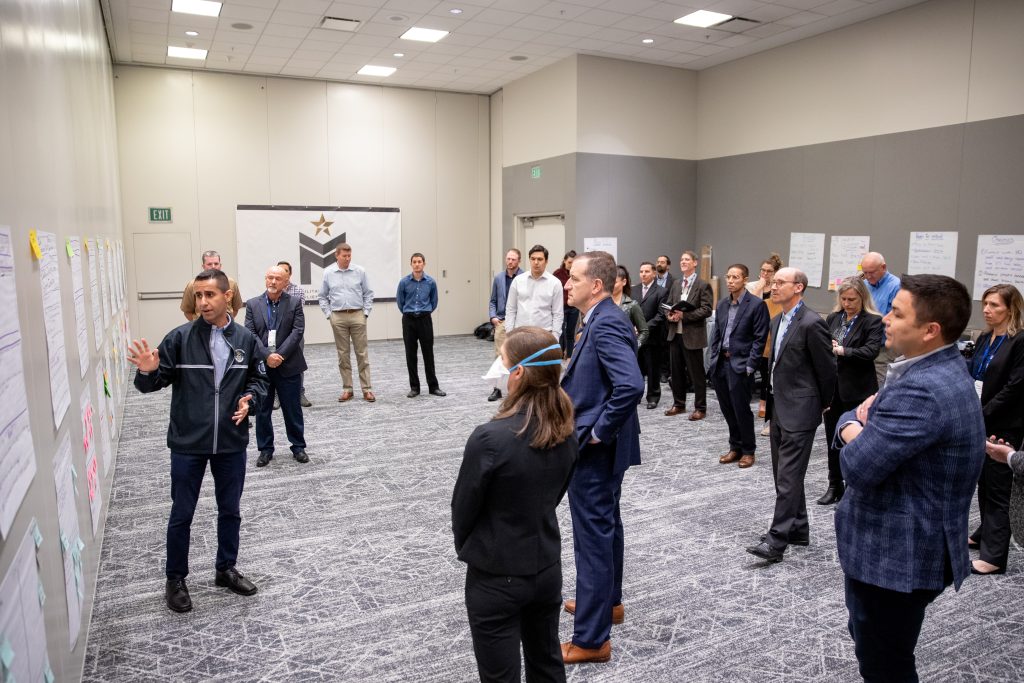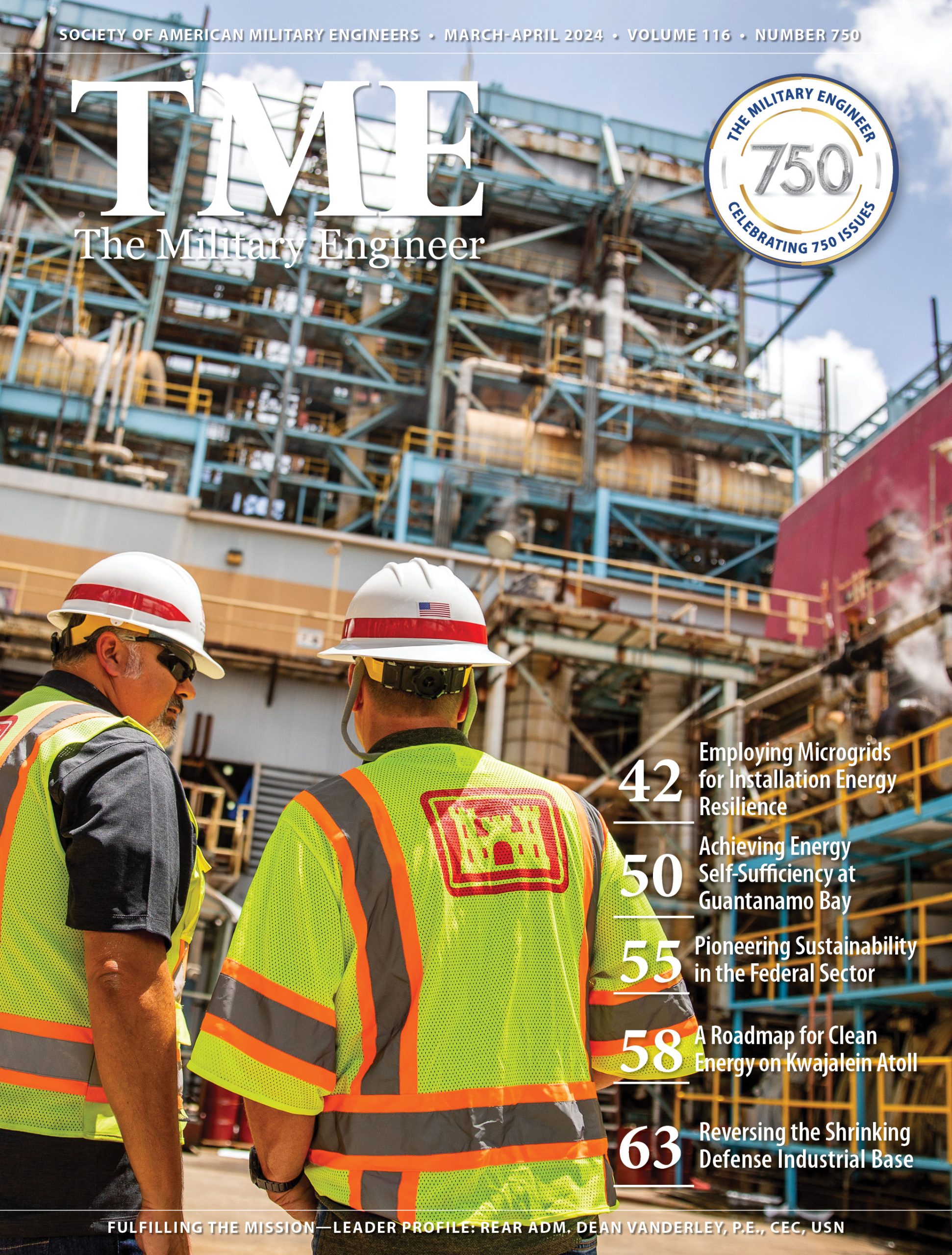By John Constantinide, P.E., CEM, LEED AP, F.SAME, Michael Wu, and Shoshana Cohen
The Military Energy Resilience Catalyst strengthens installation energy resilience by providing opportunities for energy practitioners to develop professionally and connect with experts, senior leaders, and colleagues.
Installation energy practitioners provide essential support to critical missions across the defense enterprise. However, these on-site professionals, including energy managers, community liaisons, regional energy managers, planners, and mission operators, historically did not interact with their counterparts at other military installations.
Few knew each other, and it was difficult to access the limited energy resilience knowledge resources that existed. There was no established community to connect installation energy resilience personnel across the military services so they might share technologies, case studies, and lessons learned. Even within a service, these individuals felt isolated from leadership in policy and program offices in the Pentagon. Similarly, policymakers rarely heard from installation staff on how regulatory changes and other system-wide guidance was being interpreted and implemented at the local level.

This environment of inconsistent energy program application across the Department of Defense (DOD), in 2018, would lead to a collaborative initiative funded by the U.S. Air Force, the Military Energy Resilience Catalyst (MERC), to accelerate energy projects and improve system-wide coordination. A pilot was initiated at three installations (Creech AFB, Nev.; Barnes ANGB, Mass.; and Dobbins ARB, Ga.) through MIT Lincoln Laboratory and Converge Strategies LLC.
After a successful first effort, DOD’s Environmental Security Technology Certification Program (ESTCP) then expanded the program across the military as a joint venture of Converge Strategies and Idaho National Laboratory.
Today, MERC supports installation energy resilience professionals each year by providing resources, connections, and, most importantly, a network of fellow practitioners to advance their own energy resilience project goals.
MERC’s primary focus is to empower cohort members to pursue projects that strengthen the energy resilience posture of an installation or larger regional area.
Program Experience
MERC’s primary focus is to empower cohort members to pursue projects that strengthen the energy resilience posture of an installation or larger regional area. Through a human-centered design practice, the program encourages the development of community and professional networks. Each year, up to 18 individuals are selected from across DOD. Participants receive technical assistance from experts at Idaho National Laboratory and MERC facilitators, funded travel to site visits, and access to special events.
Access to Experts. Cohort members gain access to MERC faculty, a contingent of resilience experts and policymakers from across academia, the Defense Department, and National Laboratories. These professionals donate their time as an investment to better understand energy resilience challenges and tactics for success at the installation level.
Many faculty benefit from the insights and ingenuity of installation stakeholders. Similarly, cohort members gain unique understandings from this direct connection to DOD senior leaders and technical experts they may not have had an opportunity to connect with otherwise.
Site Visits. Participants in MERC must commit to three temporary duty site visits. These trips are generously funded by ESTCP and include two locations that expose cohort members to innovative advanced energy resilience technologies. The types of site visits may include military installations, Department of Energy laboratories, or the annual ESTCP Symposium.
At these professional development opportunities, MERC participants can tangibly access energy resilience technologies. In 2019 and 2022, the cohort traveled to the University of California, San Diego and to Marine Corps Air Station Miramar, Calif., to learn directly from successful microgrid project champions. Site visits also include dedicated time for members to discuss shared barriers and tactics for successful project execution.
Energy Exchange. Each year, the program includes attendance at Energy Exchange, a conference run by the Department of Energy’s Federal Energy Management Program. MERC participants receive dedicated facilitation, customized curriculums, and pre-arranged meetings, all designed to advance their energy resilience project concepts. In addition, members brief on their individual concepts to senior defense leaders (including the Deputy Assistant Secretary of Defense for Environment & Energy Resilience and DOD’s Deputy Chief Sustainability Officer).
These touch points increase awareness of cohort projects and promote the professional development of participants.
Virtual Programming. Cohort members meet on a monthly basis for webinars and small group virtual meetings. During these online sessions, participants are exposed to new energy resilience policies, technologies, current issues, and latest innovations.
This year, MERC webinars have addressed the Energy Resilience and Conservation Investment Program, electric vehicle deployment on installations, microgrid design and training opportunities, and other topics provided by the faculty. Even in the virtual setting, MERC brings members into meaningful contact with energy resilience DOD leaders and experts to advance their project work.
Technical Assistance. The program provides two forms of technical assistance to cohort members: direct technical assistance; and access to resilience resources through the MERC online community. The Idaho National Laboratory curates the “MERC technical assistance menu” and leads its direct technical assistance offering. Depending on a member’s needs, staff can provide ad-hoc assistance, such as introductory phone calls and emails, all the way up to in-person site visits, table-top exercises, or planning charrettes.
The MERC online community is the largest online repository of energy resilience case studies, tools, policies, and events to support DOD energy resilience. While a limited version is available to the public, cohort members, faculty, and alumni have full and ongoing access to this resource.
Forging Connections
MERC has supported more than 45 installation and regional energy managers, planners, and mission operators across 40 bases in all military services.
By connecting a wide array of energy resilience practitioners, experts, and leaders to facilitate more successful energy resilience projects, the program creates a collaborative network that is beneficial to the entire DOD energy community.
Extensive Network
Across the Defense Department, there are more than 667,000 facility assets on nearly 4,700 sites and 26-million-acres. While this extensive portfolio requires steady, reliable, resilient energy resources, it also needs trained professionals tasked with operating complex and interdependent systems while navigating changing guidance, evolving standards, and other variables unique to their service or geographic area.
MERC provides a platform to help build a community of practice that spans the gaps between installation energy practitioners and other resilience experts throughout the Defense Department and the U.S. government.
John Constantinide, P.E., CEM, LEED AP, F.SAME , is Range Engineer, 45th Civil Engineer Squadron, Patrick SFB, Fla.; john.constantinide@spaceforce.mil.
Michael Wu is Principal and Co-Founder, and Shoshana Cohen is Senior Associate, Converge Strategies LLC. They can be reached at mwu@convergestrategies.com; and scohen@convergestrategies.com.
Tom Calvert-Rosenberger contributed to this article.
More News from TME
-

Fulfilling the Mission
Rear Adm. Dean VanderLey, CEC, USN, Commander, Naval Facilities Engineering Systems Command, sits down with TME to discuss the Department of the Navy’s Systems Command for shore facilities and expeditionary equipment, Naval Facilities Engineering Systems Command (NAVFAC) and its varied responsibility that directly support warfighter lethality. -

TME March-April 2024
The March-April 2024 issue of TME includes articles on energy & sustainability, an IGE Insight on efforts to grow the defense industrial base, and an interview with Rear Adm. Dean VanderLey, P.E., CEC, USN. -
SAME DC and CMAA NCC – SAVE THE DATE – Oct. 16 – 2024 Fall Joint Conference
SAVE THE DATE – Please join us for our annual 2024 Fall Joint Conference with SAME DC and CMAA NCC on Wednesday, October 16 at the Army and Navy Club at Farragut Square. Sponsorship is available for this event. Contact: Philios Angelides, PE, FACEC, F.SAME, angelidesp@gmail.com